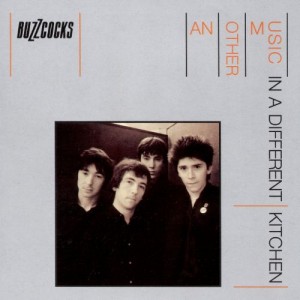Buzzcocks
Another Music In A Different Kitchen - Reissue

About this item
Like many first albums, Another Music In A Different Kitchen collected material written by the group - in particular Pete Shelley and Steve Diggle - that had been amassed during the previous years, going back to 1974 and 1975. According to Tony McGartland in his Buzzcocks: The Complete History, the songs were sequenced in the order that they were written. The play through seems to bear this out: the album begins in fast protest punk and ends in the seven minute, definitely non punk length Krautrock of ‘Moving Away From The Pulsebeat.’
Most of Shelley’s songs on the first side concern the vicissitudes of romance, but the opener Fast Cars name drops US campaigner Ralph Nader in an ecological diatribe: “They're so depressing going 'round and 'round/Ooh, they make me dizzy, oh fast cars they run me down.” ‘No Reply’, ‘You Tear Me Up’, ‘Get On Our Own’ and ‘Love Battery’ are sharp, short (all under two and a half minutes), speedy disquisitions on the tortures of interpersonal communication, love and lust played with a perfect balance between pace, abrasion and melody.
Side closer ‘Sixteen’ is something else. It’s longer and contains an avant-garde breakdown around two minutes in, recorded with each group member isolated and unable to hear each other. “It started off as a false ending,” Shelley told me in 1977: “All sloppy, and then it carries on longer so that people are thinking, “Oh I’ve just clapped but they’re not thinking — what’s up?” and then it comes back in again.” It was, as John Maher added, “A remnant of our chaos days.”
Would Shelley like to be sixteen again? “In some ways yes, in some ways no. The words go: “And I wish I was sixteen again/Then things would be such fun/All the things I'd do would be the same/But they're much more fun/ Than when you're twenty one.” Things like going for a drink — now the novelty’s worn off but the enjoyment’s still there. There’s no difference between doing something when you’re 16 and 22, except there is a difference if you’re doing it for the first time.”
Perhaps the most remarkable thing about the song is its rapid fire, venomous ending:
“And I hate modern music/Disco boogie and pop/They go on and on and on and on and on/HOW I WISH THEY WOULD STOP!” Never has a truer sentence been written about the true impetus behind Punk: not just boredom with progressive rock or dinosaur sixties acts but an intense disgust with mainstream pop music, which in 1976, the year of number one singles by Elton and Kiki, Abba, the Brotherhood of Man, Adge Cutler & the Wurzels, seemed not to have anything to do with teenage life and certainly nothing to do with excitement or the true teenage news.
The five songs on side two reflected the group moving away from simple love tropes into something more complex: as Shelley sang on ‘I Don’t Mind’, “Reality’s a dream.” Unlike the increasing militarism and violent posturing of the Clash, Buzzcocks aimed to explore male sensitivity and frailty (‘This pathetic clown’) - which in pop terms was still new, exactly what punk had set out to be. They began to use love songs as a conduit through which they could talk about other things: the nature of human relationships in a capitalistic society, the nature of reality itself.
Onstage Buzzcocks did not present as macho. Sometimes they’d try a group uniform, like the Mondrian shirts of early 1977, but mostly they just dressed as themselves: Diggle and Maher in various permutations of Mod wear, Paddy Garvey in leather jacket and skinny tie, and Shelley in a bewildering variety of styles. “It’s no good me wearing anything like that (bondage pants),” Shelley told me; “I’m just not the fashionable shape.” “You put those clothes on and you become a different character,” Diggle added: “I don’t feel myself, I feel like somebody else.”
‘Fiction Romance’ continues the themes of ‘I Don’t Mind’: male frailty, the commodification of emotions, the difference between reality and fantasy. Steve Diggle’s powerful ‘Autonomy’ spells out the true theme behind Punk: self determination. “It’s a discussion between two sides of your personality,” he told me; “It’s about discipline in yourself, like when you say you’d like to do something and you haven’t got control, you’re not autonomous. Like giving up smoking, which I’m trying to do now and it’s very difficult. I haven’t got control of myself.”
Shelley’s pell-mell ‘I Need’ tackles the capitalist perplex head on: “I used to only want but now I need/To get by with what I got but now I need.” After a fine bass led instrumental break, Shelley lays it out again: “I need sex/I need love/I need drink/I need drugs/I need food/I need cash/I need you to love me back.” ‘Moving Away From The Pulsebeat’ continues the breakneck pace: lasting at least three times the standard punk rock single, it features some stinging psychedelic solos and some rapid fire classic break beats from John Maher.
There’s a pause, then the riff of ‘Boredom’ returns: back to the beginning. Another Music in a Different Kitchen is a perfect circle: thirty five and a half minutes of tuneful, exciting and thoughtful music that stretched the boundaries of guitar pop music at the same time as it delivered on the group’s promise. It was a critical and a commercial success, reaching the UK album top twenty in March 1978 and staying there for nearly three months. But Buzzcocks had no time to rest on their laurels.
